5 Things I Wish I Knew Before Starting My Engineering Career I Know Now – 2025
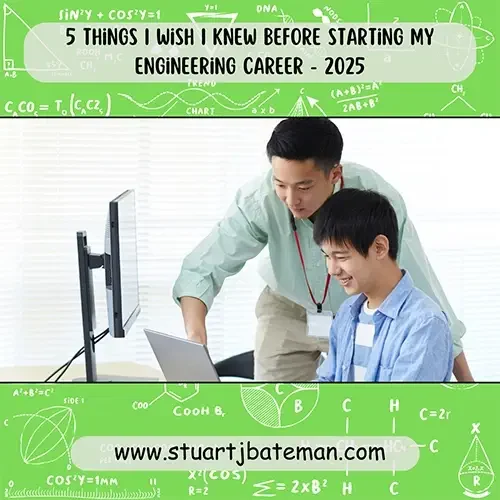
To know, is to know that you know nothing. That is the meaning of true knowledge.
Socrates
Starting an engineering career can feel overwhelming. The gap between university theory and industry reality is wider than most graduates expect. After 22+ years in mechanical and manufacturing engineering, moving from confused graduate to team leader, I’ve learned lessons that could have accelerated my growth significantly.
Here’s what I wish someone had told me on day one.
Table of Contents – Engineering Career advice
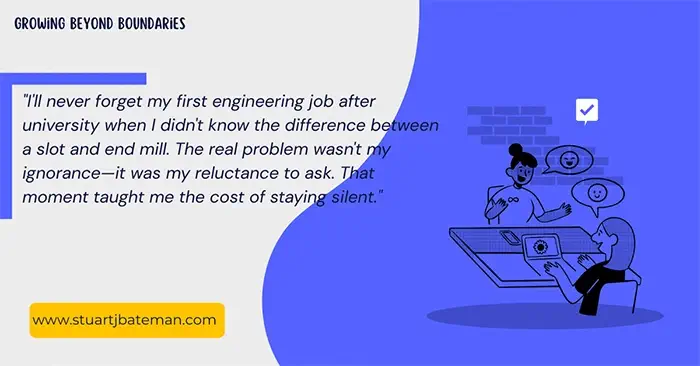
1. Mindset Shifts That Matter
My Experience
I’ll never forget my first engineering job after university when I didn’t know the difference between a slot drill and end mill. The real problem wasn’t my ignorance—it was my reluctance to ask. I was shy, wanting to keep my head down and prove myself, but this approach backfired. I didn’t learn the difference until a senior engineer reviewed my program and questioned my tooling choices. It was embarrassing to admit I didn’t know, but that moment taught me the cost of staying silent.
At Stannah, I remember attending a root cause analysis session using an Ishikawa (fishbone) diagram. Everyone was furiously writing ideas on sticky notes while I sat watching, paralyzed by uncertainty. Finally, I asked the Purchasing Manager what she was doing. She kindly explained the process and encouraged me to contribute. That simple question opened the floodgates.
Years later, I discovered the YouTube channel “Crash Course,” which ends each episode with the acronym DFTBA “Don’t forget to be asking”—but for engineers, I prefer ABAQ: “Always Be Asking Questions.” This mindset transforms everything. Ask, challenge, clarify, or simply help progress the conversation—any question adds value.
Embrace “I Don’t Know” and Learning Through Failure
- Never be afraid of saying “I don’t know”—it’s the starting point of all learning
- Being the smartest person in the room isn’t the goal; continuous growth is
- Curiosity beats ego every time
- Failure teaches more than early success—embrace it as your best teacher
- View failure as a learning opportunity, not a reflection of your worth
- Stay open-minded to new ideas while remaining appropriately sceptical of data
- Question your own biases—they often blind you to better solutions
- Ask follow-up questions to deepen understanding and ensure clarity
Commit to Lifelong Learning
- Technology evolves rapidly; your education never truly ends
- Take ownership of your professional development—no one else will
- Learn to distinguish between what’s genuinely important and what’s merely trendy
- Build learning habits that will serve you for decades
2. Career Strategy and Direction
My Experience
I’m embarrassed to admit I didn’t define my career direction until 10 years after university. I was caught in the common trap of focusing solely on earning enough to keep my family comfortable—a necessary foundation, but insufficient for long-term satisfaction.
My wake-up call came through pursuing Chartered Engineer (CEng) status with the Institution of Mechanical Engineers. This goal gave me something to work toward beyond just the next pay check. Achieving CEng proved to myself and my peers that I met the rigorous criteria set by the UK Engineering Council across five key competency areas.
Reading Stephen Covey’s “7 Habits of Highly Effective People” crystallized this further. I realized I had stumbled upon Habit 2: “Begin with the End in Mind.” Once I knew what I wanted to achieve, I could apply Habit 3: “Put First Things First,” creating a clear path forward. The other habits that proved particularly valuable were Habit 1 (Be Proactive—taking ownership of my career development) and Habit 7 (Sharpen the Saw—continuous learning and improvement).
A colleague’s advice to focus on personal development led me to LinkedIn, where I discovered engineers discussing career strategy as both a personal responsibility and something within our control. I’ve never looked back.
Define Your Path Early
- Clarify your career direction: technical specialist track versus management path
- Research companies that align with your values and long-term goals
- Identify what makes the best employers: culture, growth opportunities, mentorship programs
- Set meaningful professional goals beyond salary increases
Strategic Skill Development
- Map out the skills and knowledge required for your target roles
- Balance technical depth with essential soft skills
- Understand how academic knowledge translates to industry application
- Create a personal development plan with measurable milestones
3. Learning from Others and Experience
My Experience
This was my biggest stumbling block. I took constructive criticism as harsh judgment, which caused me to shut down and stop listening. This defensive attitude severely stunted my professional growth.
The turning point came when I joined Stannah, where I worked with a team of supportive and patient engineers who created the psychological safety I needed to receive feedback effectively. They helped me understand that feedback was a gift aimed at improvement, not an attack on my competence. Once I recognized this difference, I could accept constructive criticism even in less supportive environments.
Learning from experience happens automatically, but the benefits are minimal unless you’re actively paying attention to mistakes and failures, then extracting lessons to improve yourself.
Find Your People
- Identify role models in your field and study their career trajectories
- Learn how to find and approach potential mentors professionally
- Engage with experienced operators and technicians—they’re goldmines of practical knowledge
- Build relationships across all levels of your organization
Navigate Workplace Dynamics and Communication
- Understand how real projects work in industry, including full lifecycle management
- Prepare mentally for the reality of tight deadlines and competing priorities
- Learn to work effectively within existing systems and constraints rather than fighting them
- Actively seek constructive feedback from peers—it’s invaluable for growth
- Share your perspectives respectfully and remain open to different viewpoints
- Master multi-modal communication: sketching ideas, creating diagrams, and using visual media often convey complex concepts more effectively than words alone
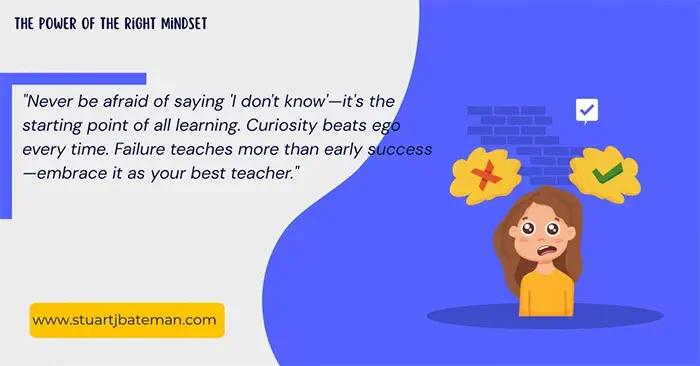
4. Professional Growth Principles for your engineering career
My Experience
Integrity, honesty, and open-mindedness became my core growth principles, though I was far from embodying them early in my career. The shift began when a Production Engineer told me, “Whatever you decide to do, right or wrong, commit to it fully.”
While this advice isn’t perfect—you shouldn’t ignore good feedback—it taught me about integrity: doing what you say you’ll do. This principle of following through on commitments became foundational to building trust with colleagues.
Reflecting on the advice and lessons you receive throughout your career helps you develop a healthy set of personal growth principles.
Decision-Making and Ownership
- Whatever you decide, commit fully and learn from the outcomes
- Take responsibility for your choices and their consequences
- Build confidence through decisive action, even when facing uncertainty
- Learn from both successful and failed decisions
Resource Awareness and Development
- Know what resources are available to develop your engineering skills
- Leverage company training programs, professional organizations, and online platforms
- Build a personal learning toolkit that includes technical resources, industry publications, and networking opportunities
- Invest in your professional development consistently, not just when required
5. The Leadership Transition
My Experience
I thought I understood the difference between managers and leaders until I started conversations with engineers from larger companies like GKN and BAE Systems. Their insights were enlightening.
Managers don’t just assign tasks—they develop people by understanding individual needs, skill gaps, and business requirements to create development plans that help others grow. Leaders go further, leading by example and thinking strategically about where their department is heading and how to better support business objectives.
The fundamental difference is between task management and strategic management. I was way off the mark until these experienced professionals enlightened me.
From Engineer to Manager
- Understand the fundamental shift from doing technical work to enabling others
- Develop skills in mentoring, coaching, and developing team members
- Learn to balance technical contributions with people management responsibilities
- Recognise that your success becomes measured by your team’s success, not just your individual output
Strategic Thinking Development
- Begin thinking beyond immediate tasks to longer-term departmental goals
- Understand how engineering decisions impact broader business objectives
- Develop the ability to communicate technical concepts to non-technical stakeholders
- Learn to balance competing priorities and resource constraints
Engineering career advice – Notes
Your engineering career is a marathon, not a sprint. Success comes from continuous learning, building meaningful relationships, and making thoughtful decisions about your path forward. The technical skills that got you hired are just the foundation—your growth as a professional depends on developing the mindset, relationships, and leadership capabilities that will serve you throughout your career.
Recommended Resources
- Books: “7 Habits of Highly Effective People” by Stephen Covey
- Professional Organizations: Institution of Mechanical Engineers (IMechE), ASME, IEEE (depending on your discipline)
- Online Learning: LinkedIn Learning for soft skills, Coursera for technical updates, industry-specific platforms
- Networking: Professional meetups, conference attendance, LinkedIn professional groups
- Mentorship Programs: Formal company programs or informal arrangements with senior colleagues
Take Action Now
If you want to learn from my mistakes and accelerate your career growth, start planning your strategy for learning, skill development, and career direction:
- Research the job market and identify common roles that align with your interests and strengths
- Create a target company list and proactively reach out about opportunities, even when they’re not actively hiring
- Conduct a skills gap analysis by comparing your current abilities with job requirements for your target roles
- Develop a learning plan with specific skills to practice and timelines for development
- Challenge your assumptions about your engineering field—write them down, then systematically prove or disprove them
- Network strategically by talking to everyone about their careers, mistakes, and lessons learned
- Define your growth principles through research and self-reflection
- Seek leadership opportunities to practice leading by example, then reflect on these experiences
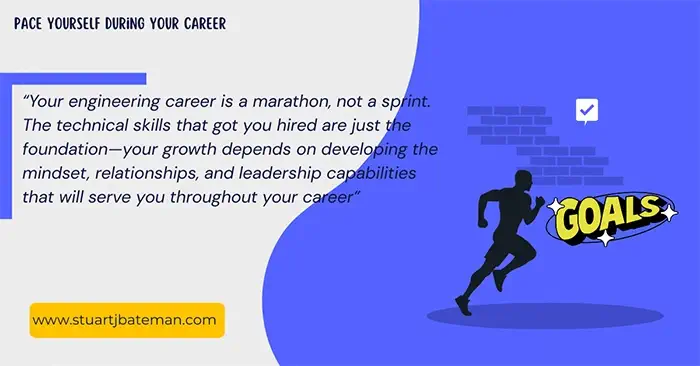
Common Misconceptions to Avoid
- “University taught me everything I need to know” – University provides the foundation, but it’s just the beginning. Real-world engineering challenges are vastly different from textbook problems.
- “Technical skills are all that matter” – While technical competence is essential, communication, teamwork, and leadership skills often determine career advancement.
- “I should figure everything out on my own” – This leads to slower learning and repeated mistakes. Leverage the experience of others through mentoring and asking questions.
- “Career planning can wait until later” – Starting early gives you a significant advantage in skill development and networking. Time compounds these benefits.
- “Feedback is criticism” – Constructive feedback is one of the fastest ways to improve. Learning to seek and receive it effectively accelerates professional growth.
Work-Life Balance: A Final Thought
Throughout this journey, remember that sustainable career growth requires maintaining your well-being and relationships outside work. The most successful engineers I know have learned to set boundaries, pursue interests beyond their technical field, and maintain the energy and perspective that comes from a balanced life. Your career is important, but it’s just one part of a fulfilling life.
FAQ
What engineering career advice do new graduates need most?
New engineering graduates should focus on developing a growth mindset, embracing “I don’t know” as a learning opportunity, and actively seeking feedback from experienced colleagues. The transition from academic theory to practical application requires humility and continuous learning.
How do I choose between technical specialist and management career paths?
Research both paths thoroughly by talking to engineers in senior technical roles and engineering managers. Consider your strengths: do you prefer deep technical problem-solving or leading teams and strategic planning? You can also switch paths later in your career—many successful managers started as technical specialists.
What’s the best engineering career advice for building professional relationships?
Start by being genuinely curious about others’ experiences and expertise. Ask thoughtful questions, offer help when possible, and maintain regular contact with your network. Remember that relationships are built on mutual value—always think about how you can contribute to others’ success.
How early should I start planning my engineering career path?
Begin career planning as soon as possible, ideally within your first year of professional work. Early planning allows you to make strategic choices about skill development, networking, and job opportunities that align with your long-term goals.
What engineering career mistakes should I avoid?
Avoid staying silent when you don’t understand something, taking constructive feedback personally, focusing only on technical skills while neglecting soft skills, and waiting for others to plan your career development. These common mistakes can significantly slow your professional growth.
How do I transition from individual contributor to engineering management?
Start by seeking opportunities to mentor junior engineers, lead small projects, and participate in strategic discussions. Develop your communication and people management skills while maintaining your technical credibility. Many companies offer leadership development programs for emerging managers.
What resources are most valuable for ongoing engineering career development?
Combine formal learning (professional organizations, conferences, online courses) with informal learning (mentorship, networking, reading industry publications). The most valuable resource is often experienced colleagues who can share practical insights and career guidance.
Internal (Resources) – Engineering Mindset
It’s great to develop the skills required for an engineering career, but you need to develop you mindset in order to tackle complex engineering problems, for that I recommend the following articles:
- How to overcome your assumptions
- How I sharpen the saw
- How to detect biases with these tools
- How to use first principle thinking like Elon
- How to use Critical thinking

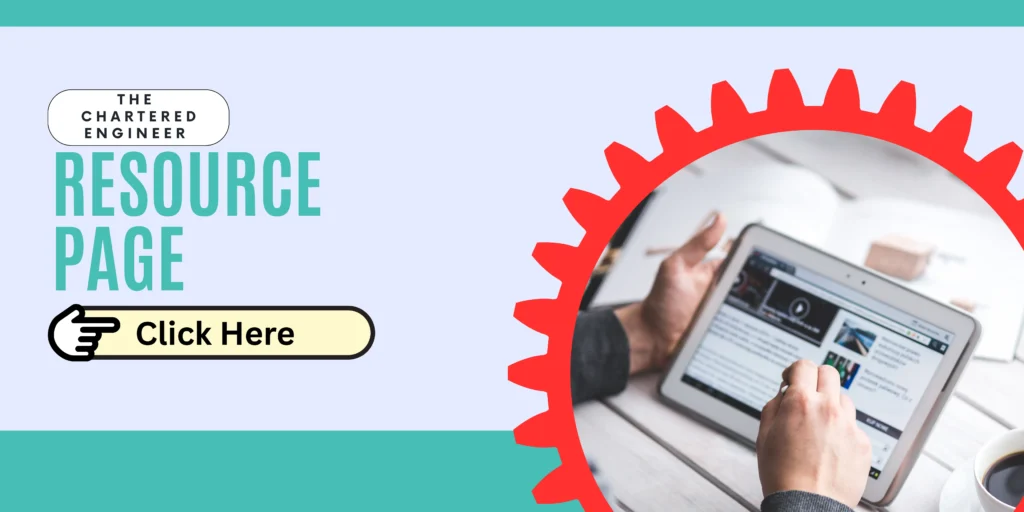
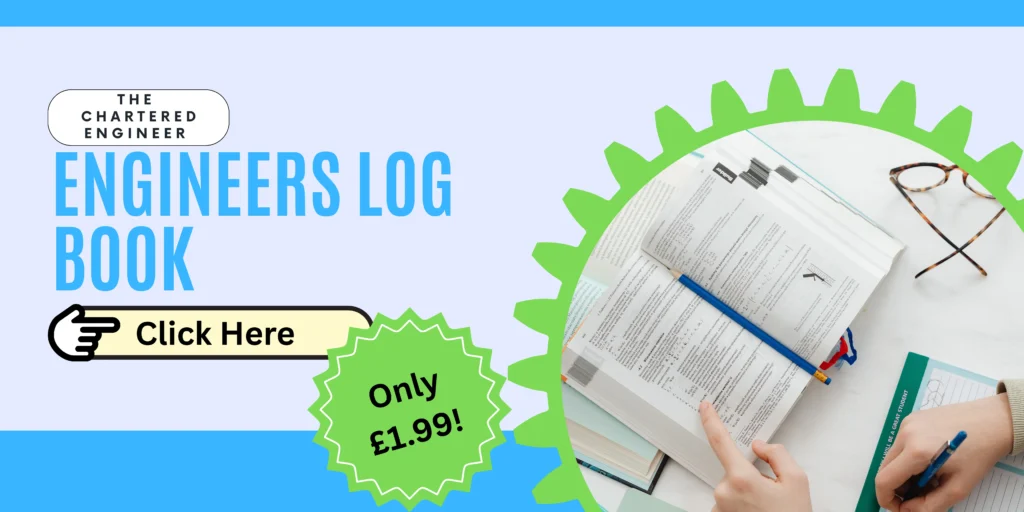
What are your thoughts? Have I covered everything or is there more you know and would like to share?
I’m always learning and improving this site and my blogs, so please feel free to get in touch with me via LinkedIn or this site to discuss any topics I have covered.
If you’re having trouble finding ways to progress check out these sites filled with free learning tools:


Discover more from The Chartered Engineer
Subscribe to get the latest posts sent to your email.